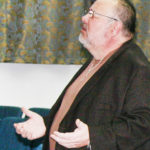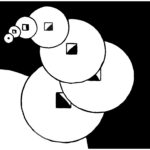Donald, who reads posts on our website, wrote and asked me to consider analyzing 1 Peter 2:24. At first, I looked at all the work I presently have and thought about politely declining the idea. But, as I read the verses, I was intrigued with the passage’s message. But, no one should get one verse alone and then take a theological or doctrinal position. To fully understand and interpret the Bible, one must take several factors into mind. Among those factors are:
- What are the keywords or phrases?
- What is the intent of the writer when he wrote the passage?
- What is the Greek emphasis and definitions of particular words?
That is not a complete list, but I think you get my point.
I am not sure what Donald’s specific concern is with this verse, but I can guess. Most of the time, when I, as a theologian, have heard others bring up this verse, they were focusing on the “you were healed” part. The question is usually like this, “If the Bible says His ‘stripes’ healed us, then why do we still get sick? Or several other questions with a similar perspective.
What I will do is attempt to analyze that verse within the context that surrounds it. Any “analysis” of anything in the Bible done out of context will likely be wrong. So, with that in mind, I will begin.
1 Peter 2:21–25
21 For you have been called for this purpose, because Christ also suffered for you, leaving you an example, so that you would follow in His steps,
To know what God wants us to understand from the phrase “you were healed,” we need to begin with verse 21, which leads us to the point intended. The beginning phrase in verse 21, “For you were called to this purpose,” is the first “clue” we will need to consider.
What purpose?
Verses 13 through 20 speak of how we must submit to the authority that God has placed is over us. In context, this means presidents, governors, mayors, pastors, husbands, parents, etc. The idea is that we also learn to submit to God Himself. You may believe that you have submitted to God already, but your actions, decision, and so forth may indicate that you have not. But God does want this from you, to submit and live as He desires. With that in mind, we now look at verse 21. I hope you agree with me that we now have the correct context to review these verses.
So then, to what “purpose” were you called to by God? The same verse answers the question, “so that you would follow His steps.” Whose steps, well, Christ, of course. In and of itself, the whole Bible is a guide toward our Lord and Savior, Jesus Christ. So, we are to follow the example that He sets for us. In this case, it was to suffer on the cross. Not just to suffer, but why? The answer is “for us.” He sustained the abuses and punishment on the death on the cross for us, and He did it for us. He wants us to follow His example of suffering for others. For us, to be willing to make sacrifices for someone else.
22 HE WHO COMMITTED NO SIN, NOR WAS ANY DECEIT found IN HIS MOUTH; 23 and while being abusively insulted, He did not insult in return; while suffering, He did not threaten, but kept entrusting Himself to Him who judges righteously;
The idea of the Lord’s suffering is emphasized further in verses 22 and 23. There we find a description of how He suffered so that we could better understand. He was innocent of any wrongdoing. He did not fool or attempt to fool anyone, and He did not even try to defend Himself.
What is the crucial question here? Well, do you and I suffer that way? Do we deal with it without complaining? Do we argue our points and try to get things to happen our way? Do we ever fool people about how much we are going through? We have to answer these questions with “sin” in mind.
What Is “Sin?”
James 4:17 (NASB) puts it like it, “So for one who knows the right thing to do and does not do it, for him it is sin.” So, therefore, now that we know that God wants us to emulate His Son, our Lord, Jesus Christ’s suffering, we need to have that in mind as we do further analysis.
24 and He Himself brought our sins in His body up on the cross, so that we might die to sin and live for righteousness; by His wounds you were healed.
Verse 24 begins with the statement that Jesus “brought our sins in His body on the cross.” The claim here is that your sins and mine were “crucified” with Christ. Why? So that “Sin” would no longer have power over you or me. We can now choose to sin or not choose to sin. Whether or not we sin will no longer be under the control of the power of “Sin. The Apostle Paul made this point much better when he said, “17 But now, no longer am I the one doing it, but sin that dwells in me. 18 For I know that good does not dwell in me, that is, in my flesh; for the willing is present in me, but the doing of the good is not. 19 For the good that I want, I do not do, but I practice the very evil that I do not want. 20 But if I do the very thing I do not want, I am no longer the one doing it, but sin that dwells in me.” Romans 7:16–20 (NASB)
He made this claim that it is not he that is sinning, “but sin that dwells in him,” because of the following phrase in verse 24 of 2nd Peter, chapter 4, “that we might die to sin.” “Dying to sin” is a critical point and must be understood if we are to make heads or tails, as it were, of what “healed” means. We get some more help from Paul in Galatians 2: 20, where he emphasizes, “I have been crucified with Christ; and it is no longer I who live, but Christ lives in me; and the life which I now live in the flesh I live by faith in the Son of God, who loved me and gave Himself up for me.”
The Bible teaches us that we have died with Christ and that we now live by “faith in the Son of God,” namely, Jesus. So, if we accept the argument that we have died to “sin,” then we are free to do what? Verse 24 says, “and live in righteousness.”
Live in Righteousness?
How can you and I live by righteousness? We can live righteously by faith by remembering that we have died on the cross with Jesus and that Christ has paid for our “sins.” Therefore, we do not have to give in to “sin,” that is, not do the right thing, but instead obey God. Living in righteousness means to obey God. And, the thing that has kept us from choosing to obey God and doing the right thing has been the “disease” “sin.”
Before we died with Christ on the cross, we live in “sin.” “Sin” in the sense that we did it naturally, not necessarily because we hated God or anything like that specific. It was just the way we did things, not necessarily with the desire to do wrong, but very much so that we wanted to do what we wanted to do. Like a virus that runs rampant (like Covid 19 today and its variants), “sin” also infects the person, and they don’t realize that they have a disease. This “disease’ “sin” affects the person. We know that this is true because the Apostle Paul included in his earlier argument the phrase, “19 For the good that I want, I do not do, but I practice the very evil that I do not want. 20 But if I do the very thing I do not want, I am no longer the one doing it, but sin that dwells in me.” Romans 7:19–20 (NASB emphasis mine)
“Sin” is the disease
You and I were infected with the disease “sin” before we died with Christ on the cross, and Jesus took our sins on Himself so that they would die with Him. He did all this with a purpose in mind, to “heal” you and me of the disease “sin” that causes people to “sin.” By His suffering before and on the cross, Jesus “healed” you.
The word “heal,” according to the dictionary, means:
(of a person or treatment) cause (a wound, injury, or person) to become sound or healthy again.
- Become sound or healthy again.
- Alleviate (a person’s distress or anguish).
So, from what was it that Jesus “healed” us? The context indicates that we were “healed” (made sound and healthy) from the propensity to choose not “to do the right thing.” Because we have been made “sound and healthy,” we can now willingly choose to “do the right thing.” The right thing is to obey God. If we choose to “do the right thing,” then we have been “healed” by his wounds (stripes).
25 For you were continually straying like sheep, but now you have returned to the Shepherd and Guardian of your souls.
You may have thought that learning that lesson was the end, but verse 25 is very much a part of why Jesus “healed” us. The question is not “What were we healed of,” the right question is, “Why were we ‘healed?’” God never does anything without reason, and it will always be part of His plan. God never heals for no reason at all, and just because He loves us is not the reason alone. As we have seen already, He has a purpose in mind. In this case, the Lord helps us understand the lesson in verse 25. The Bible explains that we “were continually straying like sheep.” If you don’t know how sheep behave and why they do what they do, you will not understand the phrase.
Sheep are dumb
I will not go into a profound lesson on sheep in this writing, but you must understand the phrase used here. If you take some time to watch a YouTube video on sheep, you might get a hint of how dumb sheep are. One thing you will learn is that sheep have a habit of straying. Straying is when instead of following the other sheep, as they usually do, a particular one will suddenly head in a different direction. You may think this is not so bad; it is just one sheep. The problem is that sheep usually follow other sheep. But, one sheep going in the wrong direction might unwittingly lead others in that same bad direction. For the shepherd, this will present a problem. He either has to leave all his sheep to look for the one that has gone astray or run after the group that follows the one errant sheep.
What does that have to do with you and Jesus “healing” you? Well, God saw that you and I had strayed away from Him. He then decided to allow Jesus to die on the cross and take all your sins and mine onto Himself. As well, we died on the cross with Him. That death on the cross “healed” us, removed the tendency to want to stray, so that we would now “return,” as it says in verse 25, “to the Shepherd and Guardian of your souls.”
Now You Have Returned
“Returning” to God is the goal of Christ’s “healing.” How do you know you have been “healed?” You now live free of the “virus/disease” called “sin” and willingly “return” to the “Shepherd.” Human diseases are not part of the context of these verses. To include human diseases, illnesses, or other human frailties, is to take verse 24 out of context. That would be wrong and misleading. No part of chapter 2 of 1st Peter even slightly implies anything about physical illnesses or diseases. To attempt to include that would be heresy at worst and misinterpreting, at the least.
Well, Donald, I hope my analysis will be helpful.






